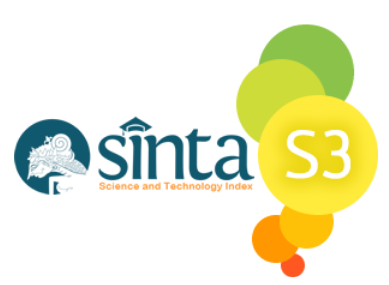THE STUDENT’S PERCEPTION OF CONSTRUCTIVE FEEDBACK GIVEN BY INSTRUCTORS IN THE PROSTHODONTIC’S CLINICAL SKILLS LEARNING
Abstract
Skills lab is a program in the Standar Kompetensi Dokter Gigi Indonesia (SKGI) that has to be carried out by dentistry students. One of them is the Prosthodontics skills lab. A constructive feedback is expected to be provided by the instructor to the students in the skills lab. This research was aimed to evaluate students’ perception about the constructive feedback given by the instructor during the Prosthodontics skills lab in the Dentistry Faculty of Universitas Brawijaya. This study used mixed methods combining the quantitative and qualitative methods. The quantitative data showed that a majority of Universitas Brawijaya’s class of 2015 dentistry students (55.9%) assumed that the feedback given by the instructor was moderate. The rest stated that they received a level 3 feedback which is feedback in form of giving correct answers and their detailed explanation. The qualitative data showed that the constructive feedback was motivation, improvement, and recommendation that the students received. The correct way of giving feedback according to the respondents’ perception is by giving explanation, positive expressions, constructive, honest, motivational, and giving demos. The benefits are as an evaluator, motivator, and a way to show students’ mistakes. The respondents’ experience during the Prosthodontics skills lab is receiving good feedback, understanding the presence of different perceptions among instructors, and understanding that there are also instructors that do not give guidance. According to Universitas Brawijaya’s class of 2015 dentistry students, the similarity in perception among instructors in giving feedback, the delivery of the feedback, the need of videos and demo during skills lab, and punctuality in the Prosthodontics skills lab need to be addressed.
Keywords
Full Text:
PDFReferences
Konsil Kedokteran Indonesia. 2006. Standar Kompetensi Dokter Gigi Indonesia.
Nurini A.A, Suryadi E, Hadianto T, Sutrisno, Yayi S.P. 2002. Skills Lab. Yogyakarta : Medika FK UGM
Nursalam dan Efendi, F. 2008. Pendidikan Dalam Keperawatan. Jakarta: Salemba Medika.
Shute,V.J. 2008. Focus on Formative Feedback, Review of Educational Research. Vol. 78, No. 1.
Black, P., & Wiliam, D. 1998. Assessment and classroom learning. Assessment in Education: Principles, Policy & Practice, 5(1), 7–74.
Hesketh, E.A. dan Laidlaw, J.M. 2002. Developing the Instinct: Feedback. Medical Teacher. 24(3):245-8. feedback to medical students: a workshop for faculty and house staff.Medical Teacher. 21(2): 161-5
Roper, W.J. 1977. Feedback in Computer Assisted Instruction. Programmed Learning and Educational Technology, 14(1), 43-49.
Mubuuke AG, Louw AJN, Van Schalkwy S. 2016. Utilizing students’ experiences and opinions of feedback during problem-based learning tutorials to develop a facilitator feedback guide: an exploratory qualitative study. BMC medical education. 16(1): 1-6.
Riezky AK. 2014. Proses umpan balik diskusi Problem-Based Learning pada mahasiswa pra klinik di Fakultas Kedokteran Universitas Abulyatama: suatu pendekatan kualitatif [Tesis]. Depok: Universitas Indonesia.
DOI: https://doi.org/10.18551/erudio.6-1.10
Refbacks
- There are currently no refbacks.
Copyright (c) 2019 Erudio Journal of Educational Innovation

This work is licensed under a Creative Commons Attribution 4.0 International License.












